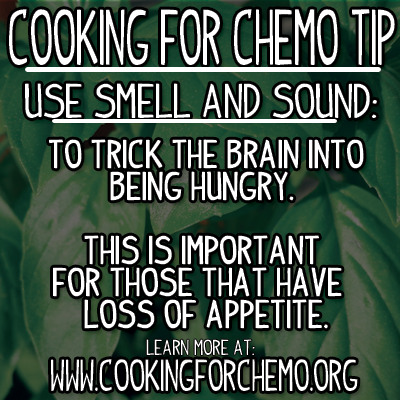How to combat loss of appetite during cancer and chemotherapy treatment
By Chef Ryan Callahan -The Cancer Chef

Learning how to use the power of smell when cooking is probably the single most important part of cooking for a cancer patient going through chemotherapy, followed by the concept of the palate cleanse. When a person eats food or drinks wine or ingests any kind of substance, the strongest sense associated with this action is not taste but smell.
When I was learning how to cook, I worked for a chef. Let’s call him “Big Chef.” Big Chef and I worked at a golf course. We always had trouble getting customers to come eat in the morning. So to get people interested in our food, Big Chef would always have me cook up bacon in the morning. One day, I asked him why we did. To me, it seemed like a waste to cook all that bacon if no one was going to eat it. What he explained to me was that the smell of the bacon would come out of the kitchen, into the club house, up through the exhaust vents, and then finally out to the golf course itself. “You see. When people smell bacon, they can’t help but get hungry. Somethin’ about that bacon that makes people come a runnin’!” What I had yet to realize at the time was that your nose is so powerful it can govern your entire digestive system!
Let’s use your dog as an example. If you start cooking bacon, where is your dog going to be? Right there next to you with the biggest set of eyes you’ve ever seen in your entire life! This is because that sense of smell they possess leads them right to the food every single time. We, as humans, like to feel detached from our animalistic senses. But the truth of the matter is that regaining control of those senses becomes a very fundamental building block when we cook for cancer patients going through chemotherapy treatments.
Taste is a very basic sense. It only encompasses a few abilities for range and depth. For example: Salty, Savory, Spicy, Sour/Bitter, and Sweet. When you experience any other sensation besides these basic flavor and taste perceptions, it is smell or the nose of your food.
The advantage of using smell and targeting your cooking towards the nose is that:
1) It gives you a wider breadth of experience while eating and
2) It allows you to build up the appetite of a cancer patient going through chemotherapy without actually putting food in front of them.
For example: When you have pot roast cooking in the oven, you can smell that the meat is slowly roasting. The fat melting and assimilating into the sauce and the muscle tissue. You can smell all of these things happening through your nose and can begin to feel hungry without ever seeing the food in person. In dogs, the smell of food can be such a powerful sensation that a dog will salivate without ever seeing the food put in front of them.
How we use the power of smell is by using aromatic herbs and spices to trick someone’s brain into being hungry. I know that in the case of my mom, I would use slowly sauteing garlic or mushrooms in olive oil or butter to illicit a hungry response.
The other thing we need to keep in mind when using smell and the nose is the adverse effect. I call the adverse reaction: pungency.
Think about the most disgusting thing or food you have ever smelled. Maybe it made you feel physically ill or maybe it was so gross that you actually did vomit? If you didn’t have a sense of smell, that would never happen. On this point, we want to think about foods that the person may find smelly, stinky, or pungent and remove them when we are cooking.
During chemotherapy, my mom, who would normally be quite happy to scarf down a tuna salad sandwich, became physically ill if I even opened a can in a different room. Think about that.
Items that may smell delicious and illicit hunger in a cancer patient during chemotherapy:
1) Sauteing any of the following in butter or olive oil:
Garlic
Onions
Mushrooms
Green or Red Peppers
2) Grilling Meats. The smell of grilling meat has a primal effect of the human body. Examples of this would be: grilled chicken, seared steak, pan fried bacon.
The following are food items that I would avoid during chemotherapy.
Not because of the nutritional value but because of the smell. The smell of these food items may cause you to lose your appetite entirely.
1) Canned tuna/canned seafood.
2) Soft mold ripened cheese. Ie: brie, roquefort, taleggio, etc.
3) Preserved and pickled foods. Ie: sourbraten, kimchi, pickled eggs, etc.
4) Stinky vegetables like cauliflower and broccoli. My mom who loved these vegetables prior to chemotherapy would become instantly nauseous at the smell of broccoli.
This by all means is not an all inclusive food list. Each person is different and will have different foods that they love and hate.
The sense of smell is so powerful in its governance over the human body that it can make you happy, it can make you sick, it can make you hungry, or it can make you turn green.
This is why when we are cooking for cancer and chemotherapy, the very first thing we want to consider is the nose.
You can purchase Cooking for Chemo …and After! by going to Amazon or Barnes and Noble.
Published on Ihadcancer.com
How To Build Up a Cancer Patient’s Appetite